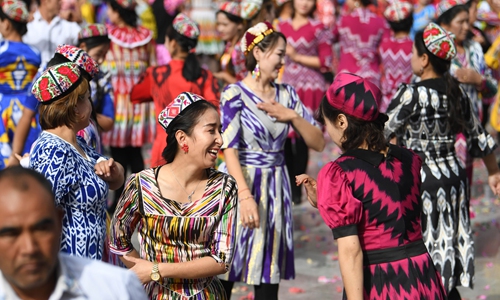HOME >> CHINA
Two sessions in Xinjiang, Tibet focus on religion, poverty-relief
By Hu Yuwei and Xu Keyue Source:Global Times Published: 2020/1/9 23:13:40
Two sessions in Xinjiang, Tibet outline 2020 tasks

People dance at a square during a culture and tourism festival themed on Dolan and Qiuci culture in Awat County of Aksu Prefecture, northwest China's Xinjiang Uygur Autonomous region. Photo:Xinhua
China's Xinjiang and Tibet regions will retain religious freedom and poverty alleviation as priorities in 2020, officials said during their local ongoing two sessions.The year of 2020 marks a crucial time point for China as it enters the homestretch in achieving the first centenary goal of building a moderately prosperous society in all respects. A stable religious situation in Southwest China's Tibet Autonomous Region and Northwest China's Xinjiang Uygur Autonomous Region paves the way for their economic boom and poverty relief, said Chinese experts.
Representatives and committee members approved at a meeting of the 11th Chinese People's Political Consultative Conference (CPPCC) Tibet Regional Committee on Wednesday that freedom of religious belief in the region is fully guaranteed, but monasteries are never allowed to be turned into illegal places that undermine national unity.
Modern monks should elaborate on the rules and doctrines of Tibetan Buddhism in line with the socialist society and social development, so as to give full play to the role of Tibetan Buddhism in spurring people on to higher attainment, Jigme Tsering, a monk of a monastery in Qamdo, said at the session.
Zhu Weiqun, former head of the Ethnic and Religious Affairs Committee of the National Committee of the CPPCC, told the Global Times on Thursday that relevant authorities and religious institutions have severely cracked down on the separatist force hidden in monasteries, and guided the patriotic and religious activities of Tibetan Buddhism for more than a decade, which have achieved good results.
The efforts have been welcomed by the majority of monks, Zhu noted.
Dzongkha Adan, vice director of Tashilhunpo Monastery in Xigaze, said monks and nuns are Buddhists and first of all they are Chinese citizens.
The success of religious work in Tibet has provided valuable experience for Xinjiang and other parts of the country, Zhu said.
The government will further implement the Party's policy on religion, strive to build a socialist Xinjiang with Chinese characteristics, and adhere to Sinicization of religion in China, Chen Quanguo, secretary of the Communist Party of China's Xinjiang Regional Committee, said at a meeting with representatives of the two sessions in Xinjiang on Wednesday.
"We should give full play to the positive role of patriotic religious personage to guide religious believers in their faith and conduct, and encourage believers to devote more in wellbeing improvement," Chen said.
Xinjiang and Tibet have long been the main grounds in China's nationwide campaign against poverty as local ethnic groups mainly dwell in deep mountains with adverse natural environment and backward infrastructure.
Both regions are poised to secure a full victory in the anti-poverty battle in 2020.
Decisive progress has been made in 2019 in the fight against poverty in Xinjiang where 645,000 people shook off poverty and the poverty rate lowered from 6.1 percent to 1.2 percent, according to the government.
Over the past year, the Xinjiang government has allocated 37.567 billion yuan ($5.40 billion) to fund poverty alleviation projects, such as providing safe drinking water for 346,000 poverty-stricken people and safe housing for 9,355 impoverished households.
By 2020, the region's governments will lift the remaining 165,000 poor people out of poverty and eliminate absolute poverty based on the current standards.
Although absolute poverty in Tibet was basically eliminated by 2019, the Tibet government will continue to focus on poverty alleviation in 2020, Qizhala, chairman of the regional government, said in his government work report delivered Tuesday at the third session of the 11th People's Congress of Tibet.
The Tibetan regional government plans to allocate funds of 13.1 billion yuan to further consolidate the achievements of poverty alleviation.
Life insurance companies in Tibet have also taken part in helping prevent people from falling back into poverty due to accidental injuries, the China News Agency Service reported.
Governments in Tibet and Xinjiang say they have also come up with innovative and environmentally -friendly ideas to help locals to shake off poverty in recent years, developing industries such as tourism and e-commerce to help villagers.
Newspaper headline: Religion, poverty-relief priority